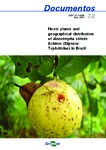Por favor, use este identificador para citar o enlazar este ítem:
http://www.infoteca.cnptia.embrapa.br/infoteca/handle/doc/1011267Registro completo de metadatos
| Campo DC | Valor | Lengua/Idioma |
|---|---|---|
| dc.contributor.author | ADAIME, R. | pt_BR |
| dc.contributor.author | PEREIRA, J. D. B. | pt_BR |
| dc.contributor.author | DEUS, E. da G. de | pt_BR |
| dc.contributor.author | JESUS-BARROS, C. R. de. | pt_BR |
| dc.date.accessioned | 2015-03-12T11:11:11Z | pt_BR |
| dc.date.available | 2015-03-12T11:11:11Z | pt_BR |
| dc.date.created | 2015-03-12 | pt_BR |
| dc.date.issued | 2014 | pt_BR |
| dc.identifier.citation | Macapá: Embrapa Amapá, 2014. | pt_BR |
| dc.identifier.issn | 1517-4559 | pt_BR |
| dc.identifier.uri | http://www.infoteca.cnptia.embrapa.br/infoteca/handle/doc/1011267 | pt_BR |
| dc.description | Anastrepha striata Schiner is one of the most common species of fruit flies in all its distribution area. It is well reported in literature infesting fruits of several vegetal species, both native and introduced ones. From the economical point of view, it is very important in the tropical and subtropical Americas for attacking species of Myrtaceae family, especially guava. It is considered a pest of great importance by the United States Department of Agriculture (USDA) and by other regulatory agencies (NORRBOM, 2003). It occurs since Mexico, Central America, southern Peru, southern Bolivia, Venezuela, Equator and Brazil, being considered the main guava pest in most of these countries. Some samples were collected in the USA (southern Texas and California), but it is not considered established in this country (HEDSTROM 1987; KATIYAR et al., 2000; NORRBOM 2003; WHITE; ELSON-HARRIS 1992). In Brazil, it occurs mainly in the north and northeast, there are also records in the west and São Paulo State (ZUCCHI, 2007). This revision has the objective to gather and spread information in technical-scientific publications about records of hosts and the distribution of A. striatain Brazil. This information associated with the geographical distribution is a basic and fundamental tool for the establishment and decision making in an Integrated Pest Management Program. | pt_BR |
| dc.language.iso | eng | eng |
| dc.relation.ispartofseries | (Embrapa Amapá. Documentos, 74). | pt_BR |
| dc.rights | openAccess | eng |
| dc.subject | Fruit fly | pt_BR |
| dc.subject | Prague plant | pt_BR |
| dc.subject | Agricultural prague | pt_BR |
| dc.subject | Integrated management | pt_BR |
| dc.subject | Guava | pt_BR |
| dc.subject | Gestão integrada | pt_BR |
| dc.subject | Praga agrícola | pt_BR |
| dc.title | Hosts plants and geographical distribution of Anastrepha striata Schiner (Diptera: Tephritidae) in Brazil. | pt_BR |
| dc.type | Folhetos | pt_BR |
| dc.date.updated | 2015-07-02T11:11:11Z | pt_BR |
| dc.subject.thesagro | Mosca das frutas | pt_BR |
| dc.subject.thesagro | Praga de planta | pt_BR |
| dc.format.extent2 | 24 | pt_BR |
| riaa.ainfo.id | 1011267 | pt_BR |
| riaa.ainfo.lastupdate | 2015-07-02 | pt_BR |
| dc.contributor.institution | RICARDO ADAIME, CPAF-AP; JÚLIA DANIELA BRAGA PEREIRA; EZEQUIEL DA GLÓRIA DE DEUS; CRISTIANE RAMOS DE JESUS BARROS, CPAF-AP. | pt_BR |
| Aparece en las colecciones: | Série Documentos (CPAF-AP)  | |
Ficheros en este ítem:
| Fichero | Descripción | Tamaño | Formato | |
|---|---|---|---|---|
| CPAFAP2014DOC74Hostplants.pdf | 970,25 kB | Adobe PDF |  Visualizar/Abrir |









